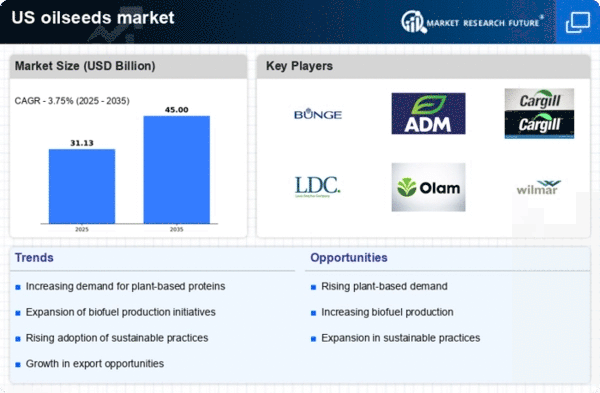Growing Biofuel Production
The expansion of biofuel production is emerging as a significant driver in the oilseeds market. With the increasing emphasis on renewable energy sources, oilseeds such as soybeans and canola are being utilized for biodiesel production. In 2025, biofuel derived from oilseeds is expected to account for approximately 15% of the total biodiesel market in the US. This trend is fueled by government mandates and incentives aimed at reducing greenhouse gas emissions and promoting sustainable energy solutions. As biofuel production ramps up, the demand for oilseeds is likely to surge, leading to increased investment in oilseed cultivation and processing facilities. This shift not only supports energy diversification but also enhances the economic viability of the oilseeds market.
International Trade Dynamics
International trade dynamics are increasingly influencing the oilseeds market. The US is a major exporter of oilseeds, particularly soybeans, to countries such as China and the European Union. Trade agreements and tariffs can significantly impact export volumes and pricing structures. In 2025, it is anticipated that trade tensions may continue to shape the landscape, with potential fluctuations in demand from key markets. For instance, any changes in import tariffs could either bolster or hinder US oilseed exports, thereby affecting domestic prices and production levels. As global demand for oilseeds remains robust, understanding these trade dynamics is essential for stakeholders in the oilseeds market, as they navigate the complexities of international commerce.
Government Policies and Subsidies
Government policies play a crucial role in shaping the oilseeds market. In the US, various subsidies and support programs are designed to encourage oilseed production, particularly for crops like soybeans and sunflowers. These initiatives aim to stabilize prices and ensure a steady supply of oilseeds for domestic consumption and export. For instance, the USDA has allocated substantial funding to support farmers transitioning to oilseed crops, which could lead to a projected increase in oilseed acreage by 10% over the next few years. Such policies not only enhance the profitability of oilseed farming but also contribute to the overall growth of the oilseeds market. As these programs evolve, they may further influence planting decisions and market dynamics.
Rising Demand for Plant-Based Oils
The increasing consumer preference for plant-based oils is a notable driver in the oilseeds market. As health awareness rises, consumers are gravitating towards oils derived from oilseeds, such as soybean and canola, which are perceived as healthier alternatives to animal fats. In 2025, the demand for these oils is projected to grow by approximately 5% annually, reflecting a shift in dietary habits. This trend is further supported by the food industry, which is incorporating more plant-based ingredients into their products. Consequently, the oilseeds market is likely to experience heightened activity as manufacturers respond to this demand, potentially leading to increased production and investment in oilseed cultivation. The overall growth in the plant-based oil segment could significantly influence pricing and availability in the market.
Technological Innovations in Agriculture
Technological advancements in agricultural practices are significantly impacting the oilseeds market. Innovations such as precision farming, genetically modified organisms (GMOs), and advanced pest management techniques are enhancing crop yields and reducing production costs. For example, the adoption of GMO soybeans has led to yield increases of up to 20% in some regions, making oilseed production more efficient. As farmers increasingly embrace these technologies, the oilseeds market is likely to benefit from improved supply chain efficiencies and reduced environmental impact. Furthermore, the integration of data analytics in farming practices may enable better decision-making, potentially leading to a more resilient oilseed sector. This technological shift could reshape the competitive landscape of the market.
















